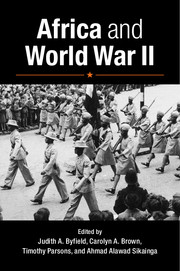Book contents
- Frontmatter
- Dedication
- Contents
- List of Contributors
- Acknowledgments
- Preface
- ONE INTRODUCTION
- 1 The Military Experiences of Ordinary Africans in World War II
- 2 Producing for the War
- 3 African Labor in the Making of World War II
- TWO COLONIAL SUBJECTS AND IMPERIAL ARMIES
- THREE MOBILIZING COMMUNITIES AND RESOURCES FOR THE WAR EFFORT
- FOUR RACE, GENDER, AND SOCIAL CHANGE IN A TIME OF WAR
- FIVE EXPERIENCING WAR IN AFRICA AND EUROPE
- SIX WORLD WAR II AND ANTICOLONIALISM
- SEVEN CONCLUSION
- Index
2 - Producing for the War
from ONE - INTRODUCTION
Published online by Cambridge University Press: 05 May 2015
- Frontmatter
- Dedication
- Contents
- List of Contributors
- Acknowledgments
- Preface
- ONE INTRODUCTION
- 1 The Military Experiences of Ordinary Africans in World War II
- 2 Producing for the War
- 3 African Labor in the Making of World War II
- TWO COLONIAL SUBJECTS AND IMPERIAL ARMIES
- THREE MOBILIZING COMMUNITIES AND RESOURCES FOR THE WAR EFFORT
- FOUR RACE, GENDER, AND SOCIAL CHANGE IN A TIME OF WAR
- FIVE EXPERIENCING WAR IN AFRICA AND EUROPE
- SIX WORLD WAR II AND ANTICOLONIALISM
- SEVEN CONCLUSION
- Index
Summary
The production of agricultural, forestry, and mineral resources in Africa proved central to the prosecution of World War II. Without Africa's resources, especially after 1942, Britain and the United States would not have been able to produce the technology or provide the transportation their armies required. Equally important, African resources helped maintain Britain's national economy both during and after the war. This chapter considers the central role that African resources played in the prosecution of the war and in the survival of European powers. Further, it supports Ashley Jackson's contention that the rapid mobilization of African resources enhanced the continent's value in the eyes of imperial powers.
Africa's central role unfolded on the ground in distinctive ways not fully appreciated by an earlier generation of scholars. In an address given at Chatham House on October 24, 1944, social anthropologist Meyers Fortes attempted to assess the impact of World War II on British West Africa. After considering the political and social implications of the war, he declared that the “impact of the war on West Africa has been most powerful in the economic sphere.” He noted that even within the economic sphere, the impact was uneven. The greatest impact was in the sector producing raw materials for the world market while the subsistence sector experienced the least. Meyers built his analysis on the notion that production for subsistence occurred in an arena that was separate and apart from production for the world market; however, subsistence production and the production of raw materials for the world market were integrally linked. In fact, we can argue that the link between subsistence production and the production of raw materials for the world economy intensified during the war years because the war effort also required increasing production of food crops. The war brought about unanticipated and sometimes contradictory outcomes in Africa. Ultimately this chapter helps us to better understand the dynamics between the macro and micro planes of analysis as Africa and the imperial powers that controlled it engaged in total war.
- Type
- Chapter
- Information
- Africa and World War II , pp. 24 - 42Publisher: Cambridge University PressPrint publication year: 2015
- 6
- Cited by

